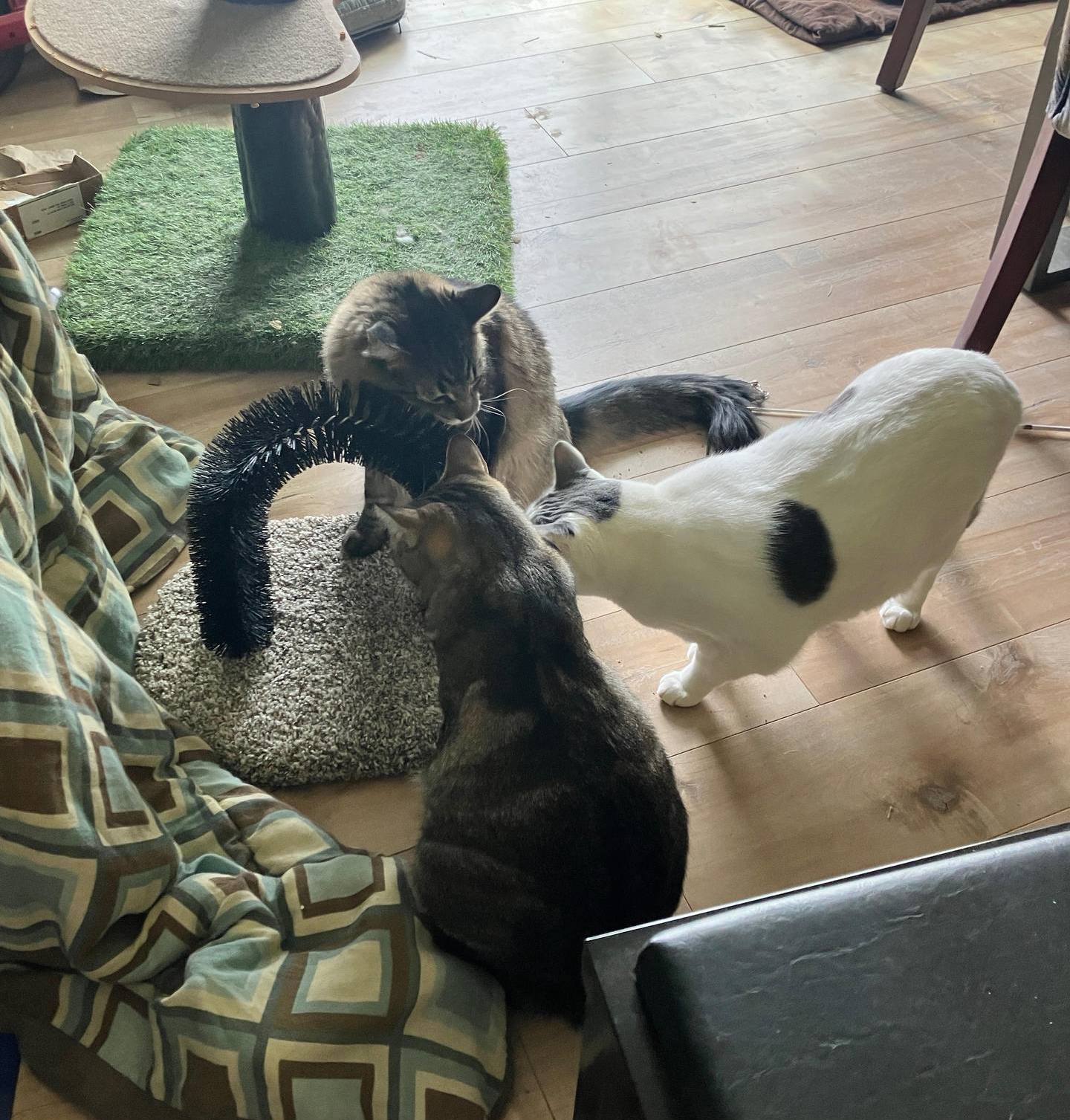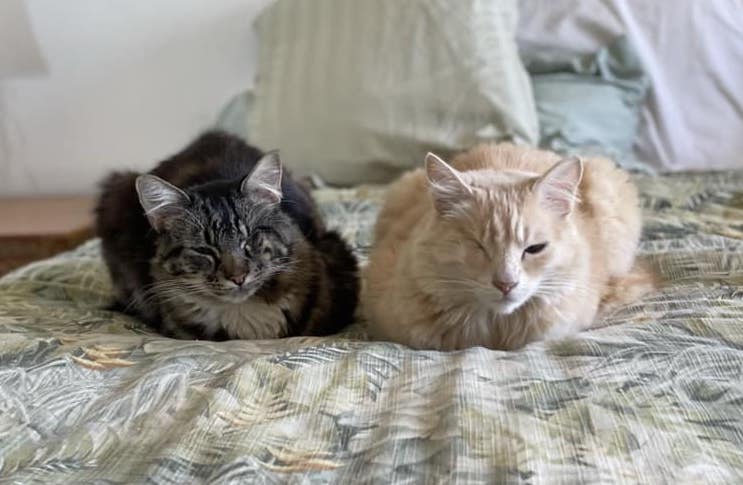
Do you have one cat? That’s one cat only, for whatever reasons. Are you wondering whether you should, at this point, adopt another cat? I know several people who are asking themselves this question, so I invited experienced cat guardians on my Friends list to chime in with their answers. The topic: Add a second cat … or don’t?
Last week, I offered some of the answers and suggestions. This week, more input.
“Please share your advice and suggestions for novice cat guardians who are thinking about adopting a second cat to join their currently one-cat family. What are some important issues to consider—for the humans in the household and for the cats?
“Expense? Amount of care needed? Space? Temperament and histories on both cats? Same age or age gap? What else?
“If someone you know asks if adding a second cat would be a good choice for their family (including both cats), what questions would you encourage them to ask about the second cat? What should they consider about the cat they already have?”
Michaela Kelso (Washington) I may be biased, but I like having more cats versus having only one. That being said, it depends on context: Do you spend a lot of time away from your cat? A playmate can help your cat to live a more active life. Are you considering adopting a cat/kitten? If you have a senior cat, it may be happier alone if it has never had “cat friends.” Adopt two kittens from the same litter for triple the fun.

Photo by Michaela Kelso
Deb Hunt (Washington) I am the poster person for foster fails since I’ve been in rescue all of my life. A person’s lifestyle would factor into being a one- or two-cat person.
A) If you work from home, are retired, etc., one cat is easy-peasy.
B) If you’re a working person and away from home, I highly recommend adopting two siblings. They have each other during your absence and are less stressed.
C) Introducing any new cats to a household can prove challenging. They’re generally not open to any additions.
D) Domesticated or feral should be considered, because they each hold a special gift.
I have a blended colony of feral (TNR), and was lucky when I rescued a dumped momma and two babies at the same time. MC (Momma Cat) was a baby herself, yet she accepted the ferals and we achieved a successful merger.
Betsy Wilhelms (Washington) It all depends on the cat. Just like people, some are social and some prefer to survey all of their domain, alone, unbothered by needy riffraff.
Gwen Jones (California) I had one cat for years. When I adopted a second, the first one was happy hanging out with him all the time—I got very little of her attention. When he died tragically at three, she once again sought my company. My takeaway is that two cats can bond with each other to the point that the human means little more than a food resource.

Photo by Gwen Jones
Kelsi Blaser (Washington) I agree that it does depend on your cat and situation, BUT most cats thrive when they have the ability to socialize. Studies have shown that cats with kitty siblings are healthier, happier, and live longer on average! The key is homing in. If you don’t introduce your cats properly, they may never get over the initial fear/defensiveness. But that’s an owner error, no fault to the precious babies. The more you put into caring for your cats, the happier and healthier they will be. Playtime every day, using meal times as enrichment (lick mats, snuffle mats, puzzles, etc.), brushing their fur and teeth, clipping nails regularly, cuddle times, researching proper feline nutrition (not just giving kibble or something similar), etc. And I feel like having more than one cat can help SO much with the daily enrichment because they will play with each other, chase each other, cuddle, etc.
Isabel Alvarez Arata (Texas) I have a single cat and have considered adding another to our home. I’m just not ready yet. While adopting two bonded cats is fantastic for everyone, adding a second cat down the line in hopes they will bond can be challenging. I am unsure about how my current cat will react and if there will be a stressful intro period. We have a good thing going right now with one dog and one cat, so I’m going to keep it that way for the time being.
Trudy Meakin Rogers (Washington) As Foster Coordinator for Partners For Pets, I encourage—if there are no other cats in the house—adopting any kittens under six months with another one close to their same age. At these stage, they learn their life lessons, very much as our own children do when they enter school. As a foster, I strongly encourage adopting two kittens. They become very lonely by themselves and lack opportunities to learn how to play nicely with others. Together, they bond with each other and are far more secure with you. If you decide to adopt just one, you need to be prepared for ‘only child’ syndrome and making that cat your number-one attention target. (If you are adopting a 1+ year old, keep in mind that some cats may prefer to be the only star in the home.)
Sara Maynard (Port of Spain, Trinidad and Tobago) When I had two cats, I never put them together. They were always separated, as I adopted older cats or ones with disabilities, and I was worried they would fight or bully each other. Years ago I took in a cat with a behavioral issue who attacked my blind cat. Ever since then, I’ve been afraid to put cats together who didn’t grow up with each other. This has, however, changed in the last few months.
A year ago I adopted an adult tomcat who was visually impaired (my last blind cat passed away; he had a number of health issues, but he did well for 10 years). Jan took some time to settle in, and he had some less than desirable traits, but slowly he started becoming less aggressive and I noticed he would seek out my company—something he didn’t do as a rule. I was contacted about a blind kitten (female) and thought I would a try putting them together. I decided to board both cats in a neutral space, so asked the cat sitter if he would be willing to do a slow introduction, to which he agreed. It took two weeks of them getting to know each other, but now they are perfect together. In fact, Billi the kitten is in charge and rules poor Jan with a little paw of iron … or rather, he allows her to think that she does. They have formed a close bond in the three months I have had them, and I can see such a positive change in his personality. I have separate food and water bowls, and four litter boxes, but they tend to switch bowls and boxes. I also get two of everything toy-wise.
My daughter also took in a second cat as company for her old cat, and they also get on quite well. He does, however, look to retreat to a quiet place when the second cat gets too much for him to handle. From the perspective of a shelter, we do encourage people to take two kittens together, especially siblings (something we don’t do for dogs), and I often get updates about how well the siblings play together. If you have a busy lifestyle but want a cat, you should consider two.
Photo of my cats in their cat room (they are indoor only, and have a day area and a room for the night)

Photo by Sara Maynard
Lili Chin (California) All our friends suggested adopting two cats instead of one, so we intentionally sought out a bonded pair. We couldn’t be happier. Seeing them talk, play, snuggle, allogroom, argue and make up, and express very different personalities is a joy.
Janice Backes Biniok (Wisconsin) When I got two kittens at once, I was amazed at how much easier it was to have two cats who occupied each other. Why didn’t I think to do this with my other cats, I wondered? Well, now I know why. The vet bills for vaccines and neuter/spay surgery for TWO cats was astronomical! Vet expenses have become almost unaffordable these days, so that should be a major consideration when deciding how many pets you want.



